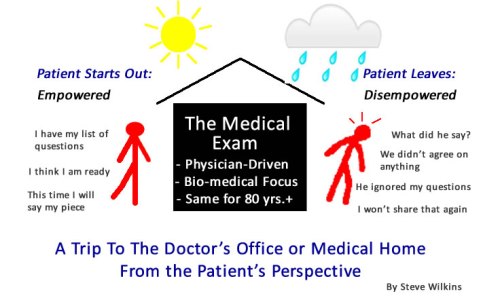July 25th, 2012 by Dr. Val Jones in Health Tips, Opinion, True Stories
6 Comments »
 Six weeks ago I had a skin lesion removed by a plastic surgeon. About 7 days after the biopsy, I received a letter from the pathology lab where the sample had been analyzed under a microscope. I eagerly opened the letter, assuming that it contained test results, but was disappointed to find a bill instead. As a physician, it felt strange to be in a position of having to wait for a colleague to give me results that I was trained to understand for myself. However, I knew that in this case I was wearing my “patient hat” and that I’d need to trust that I’d receive a call if there was an abnormality. I haven’t received a call yet, and I assume that no news is good news. But what if no news is an oversight? Maybe there was a communication breakdown between the path lab and the surgeon (or his office staff) and someone forgot to tell me about a melanoma? Unlikely but possible, right?
Six weeks ago I had a skin lesion removed by a plastic surgeon. About 7 days after the biopsy, I received a letter from the pathology lab where the sample had been analyzed under a microscope. I eagerly opened the letter, assuming that it contained test results, but was disappointed to find a bill instead. As a physician, it felt strange to be in a position of having to wait for a colleague to give me results that I was trained to understand for myself. However, I knew that in this case I was wearing my “patient hat” and that I’d need to trust that I’d receive a call if there was an abnormality. I haven’t received a call yet, and I assume that no news is good news. But what if no news is an oversight? Maybe there was a communication breakdown between the path lab and the surgeon (or his office staff) and someone forgot to tell me about a melanoma? Unlikely but possible, right?
Patients experience similar anxiety in regards to lab tests on a constant basis. In a perfect world, they’d receive results at the same time as their doctors, along with a full explanation of what the tests mean. But most of the time there’s a long lag – an awkward period where patients have to wait for a call or make a nuisance of themselves to office staff. Shouldn’t there be a better way?
The New York Times delves into the issue of “the anxiety of waiting for test results,” with some helpful tips for patients in limbo:
As patients wait for test results, anxiety rises as time slips into slow motion. But experts say patients can regain a sense of control.
- Start before the test itself.
- Because fear can cloud memory during talks with doctors, take notes. If you can, bring a friend to catch details you may miss.
Some pretest questions:
- What precisely can this test reveal? What are its limitations?
- How long should results take, and why? Will the doctor call with results, or should I contact the office?
- If it’s my responsibility to call, what is the best time, and whom should I ask for?
- What is the doctor’s advice about getting results online?
Do I think that patients should have access to their results without their physician’s review? While my initial instinct is to say “yes,” I wonder if more anxiety may be caused by results provided without an interpreter. There are so many test results that may appear frightening at first (such as a mammogram with a “finding” – the term, “finding,” may mean that the entire breast was not visualized in the image, or that there was a shadow caused by a fatty layer, or -less commonly – it can also indicate that a suspicious lesion was observed). I’m not arguing that patients can’t understand test results on their own, but medicine has its own brand of jargon and nuances that require experience to interpret.
Consider the slight deviations from the mean on a series of blood tests. They can be perfectly normal within the patient’s personal context, but may simply be listed by the lab as high or low. This can cause unnecessary anxiety for the patient. And what about PAP smear results that are listed as “ASCUS” – atypical squamous cells of undetermined significance? These can occur if the patient merely had recent sexual intercourse, and are not necessarily indicative of cancer at all.
And what about the “ambulance chasing lawyers” out there? Will there be additional frivolous law suits created by lab test results reported direct-to-consumer as abnormal in some way (when they really aren’t, given the full clinical picture) and patients assuming that their physician was negligent by not reporting the abnormality to them sooner? It could happen.
In the end I think that physicians all need to make a concerted effort to forward (with an explanation when necessary) lab test results to patients as quickly as possible. But since doctors are the ones ordering the tests in the first place, they do have a right to see them (before the patient when appropriate) – and an obligation to pass on the information in a timely and fully explained manner. That’s the value of having a physician order a test – their expertise in interpreting the results are part of the package (and cost). When patients order their own tests (and in some cases they can) then they should be first to receive the results.
As for me, I’m going to have to resort to “office staff nuisance” to get my results confirmed… just like any other regular patient. Oh well. 😉
June 27th, 2012 by Dr. Val Jones in Health Tips, Opinion, Research
1 Comment »
 One would think that happiness and healing are inextricably linked in healthcare, but the Happy Hospitalist (HH) raises an interesting question: is modern medicine’s emphasis on patient satisfaction (and shared decision-making) sacrificing our quality of care? A recent study found that patients who preferred their physicians to take the lead in their medical decision-making had shorter, less costly hospital stays.
One would think that happiness and healing are inextricably linked in healthcare, but the Happy Hospitalist (HH) raises an interesting question: is modern medicine’s emphasis on patient satisfaction (and shared decision-making) sacrificing our quality of care? A recent study found that patients who preferred their physicians to take the lead in their medical decision-making had shorter, less costly hospital stays.
HH argues that if physicians are expected to perform like airline pilots, reliably choosing/performing the best course of action for those depending on them, then patients should behave like passengers. In other words, passengers don’t tell the pilot how to fly the plane, nor should patients override a physician’s clinical judgment with personal preferences.
I think this analogy misses the mark because patients are rarely interested in making decisions about how a physician accomplishes her task, but rather which tasks she undertakes. Flight passengers aren’t interested in quibbling about the timing of landing gear, they are interested in the selection of their destination city. And so they should be.
While there may be a correlation between physician-led decision-making and shorter hospital stays, I’m not convinced that this translates to improved care quality. For the study subjects, discharge could have been delayed because the “empowered” patients insisted on ensuring that a home care plan was in place before they left the hospital. Or perhaps they wanted to get their prescriptions filled before going home (knowing that they couldn’t get to their home pharmacy over the weekend)? The study did not assess whether or not the discharge delays reduced readmission rates, nor did it seek to determine the cause of prolonged stays. This study alone is insufficient to draw any conclusions about the relative value of the patient empowerment movement on health outcomes.
While I certainly empathize with HH about the excessive focus on patient satisfaction surveys over true quality care, I strongly believe that an educated, participatory patient is our best ally in the practice of good medicine. There are simply too many cogs and wheels turning at once in the healthcare system to be able to ensure that the right care is provided at the right time, every time. We need all the help we can get to monitor our care plans in order to avoid medical errors, compliance problems and missed opportunities.
If you see something, say something. That principle applies to healthcare as much as it does to flight safety.
November 30th, 2011 by StevenWilkinsMPH in Opinion
1 Comment »

I may not know how to tell the difference between an empowered patient, an engaged patient, or an activated patient. But I do know that the fastest way to disempower, disengage, and de-activate any patient is a trip to the doctor’s office or the hospital. A visit to an average primary care physician (or specialist) is to an empowered/activated/engaged patient what Kryptonite is to Superman. It will stop all but the strongest willed patients dead in their tracks.
 We patients have been socialized that way. Think about your earliest memories of “going to the doctor.” For me, I remember my Mom taking me to the Pediatrician. Early on I learned by watching the interaction between my Mom and the doctor that they each had a role. The doctor’s role was that of expert – he spoke and my Mom listened. I was there just to have one or more extremities twisted and prodded. And oh the medicinal smell…
We patients have been socialized that way. Think about your earliest memories of “going to the doctor.” For me, I remember my Mom taking me to the Pediatrician. Early on I learned by watching the interaction between my Mom and the doctor that they each had a role. The doctor’s role was that of expert – he spoke and my Mom listened. I was there just to have one or more extremities twisted and prodded. And oh the medicinal smell…
Things haven’t changed much in the 40 years since I was a kid sitting in Dr. Adam’s office. Read more »
*This blog post was originally published at Mind The Gap*
September 28th, 2011 by AndrewSchorr in Opinion
No Comments »

As we often say at Patient Power, there is no one source for medical information. The same is true when it comes to support for patients. No one organization is THE place to go and has all the answers.
That may sound obvious. But just as it has taken a long time to dislodge the “Doctor as God” perception or “I’m the doctor and you’re not” put-down of “problem patients,” there have been some non-profit advocacy groups that have seen themselves as the “be all and end all” for conditions they cover. In both cases, the arrogant doctor and the “100,000 pound gorilla” organization, neither took what I call the “big tent” view. In their view, they were the tent and there was no room for anyone else. That’s never been our view and I wanted to tell you how we are celebrating our relationships with a multitude of partners, many of whom are becoming friends. Read more »
*This blog post was originally published at Andrew's Blog*
July 29th, 2011 by Davis Liu, M.D. in Opinion
3 Comments »

 Let me say first that I am a practicing primary care doctor who is very much focused on patient centered care. Though I cannot go back to being a patient who is unaware about what a doctor does, the terminology she uses, or what the importance of certain test results are, I can empathize with the overwhelming amounts of information, challenges, and stressors patients and families can have in navigating the healthcare system to get the right care. This is the reason I wrote my book.
Let me say first that I am a practicing primary care doctor who is very much focused on patient centered care. Though I cannot go back to being a patient who is unaware about what a doctor does, the terminology she uses, or what the importance of certain test results are, I can empathize with the overwhelming amounts of information, challenges, and stressors patients and families can have in navigating the healthcare system to get the right care. This is the reason I wrote my book.
However, over the past few months I’ve noticed a particularly disturbing trend. Patients are not consulting doctors for advice, but rather demanding testing for diagnoses which are not even remote possibilities. A little knowledge can be dangerous particularly in the context of little to no clinical experience. Where many patients are today are where medical students are at the end of their second year – lots of book knowledge but little to no real world experience.
More patients are becoming the day traders of the dot.com boom. Everyone has Read more »
*This blog post was originally published at Saving Money and Surviving the Healthcare Crisis*
 Six weeks ago I had a skin lesion removed by a plastic surgeon. About 7 days after the biopsy, I received a letter from the pathology lab where the sample had been analyzed under a microscope. I eagerly opened the letter, assuming that it contained test results, but was disappointed to find a bill instead. As a physician, it felt strange to be in a position of having to wait for a colleague to give me results that I was trained to understand for myself. However, I knew that in this case I was wearing my “patient hat” and that I’d need to trust that I’d receive a call if there was an abnormality. I haven’t received a call yet, and I assume that no news is good news. But what if no news is an oversight? Maybe there was a communication breakdown between the path lab and the surgeon (or his office staff) and someone forgot to tell me about a melanoma? Unlikely but possible, right?
Six weeks ago I had a skin lesion removed by a plastic surgeon. About 7 days after the biopsy, I received a letter from the pathology lab where the sample had been analyzed under a microscope. I eagerly opened the letter, assuming that it contained test results, but was disappointed to find a bill instead. As a physician, it felt strange to be in a position of having to wait for a colleague to give me results that I was trained to understand for myself. However, I knew that in this case I was wearing my “patient hat” and that I’d need to trust that I’d receive a call if there was an abnormality. I haven’t received a call yet, and I assume that no news is good news. But what if no news is an oversight? Maybe there was a communication breakdown between the path lab and the surgeon (or his office staff) and someone forgot to tell me about a melanoma? Unlikely but possible, right?

 One would think that happiness and healing are inextricably linked in healthcare, but the
One would think that happiness and healing are inextricably linked in healthcare, but the 



 Let me say first that I am a practicing primary care doctor who is very much focused on patient centered care. Though I cannot go back to being a patient who is unaware about what a doctor does, the terminology she uses, or what the importance of certain test results are, I can empathize with the overwhelming amounts of information, challenges, and stressors patients and families can have in navigating the healthcare system to get the right care. This is the reason I wrote
Let me say first that I am a practicing primary care doctor who is very much focused on patient centered care. Though I cannot go back to being a patient who is unaware about what a doctor does, the terminology she uses, or what the importance of certain test results are, I can empathize with the overwhelming amounts of information, challenges, and stressors patients and families can have in navigating the healthcare system to get the right care. This is the reason I wrote 







